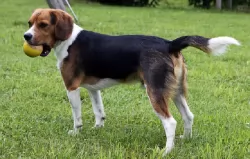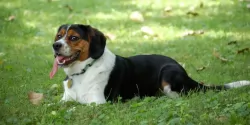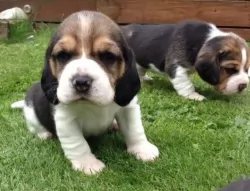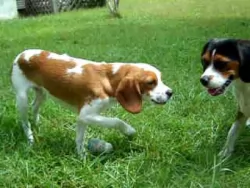 MyDogBreeds
MyDogBreeds Lurcher is originated from United Kingdom but Beaglier is originated from Australia. Lurcher may grow 35 cm / 14 inches higher than Beaglier. Lurcher may weigh 22 kg / 49 pounds more than Beaglier. Both Lurcher and Beaglier has almost same life span. Both Lurcher and Beaglier has almost same litter size. Lurcher requires Low maintenance. But Beaglier requires High maintenance
Lurcher is originated from United Kingdom but Beaglier is originated from Australia. Lurcher may grow 35 cm / 14 inches higher than Beaglier. Lurcher may weigh 22 kg / 49 pounds more than Beaglier. Both Lurcher and Beaglier has almost same life span. Both Lurcher and Beaglier has almost same litter size. Lurcher requires Low maintenance. But Beaglier requires High maintenance
 The Lurcher is a crossbreed dog that doesn’t seem to have too much certainty around it. There are stories that Lurchers may have been bred to produce a sighthound with more intelligence for hunting.
The Lurcher is a crossbreed dog that doesn’t seem to have too much certainty around it. There are stories that Lurchers may have been bred to produce a sighthound with more intelligence for hunting.
Hunters discovered that breeding certain breeds with sight-hounds produced a dog better suited for hunting and working purpose.
A Lurcher is a sighthound, a classic working crossbreed and some of the dogs used to bring about this breed were Greyhounds, Deerhounds, Whippets, Border Collies, Bedlington Terriers and Irish Wofhounds among others. This means that the Lurcher has many different looks as well. In the UK, Lurchers have their own shows, but no registry recognizes the dog.
 The Beaglier beginnings are set in Australia. Before around 30 years, breeders cross-breed the Beagle and the Cavalier King Charles Spaniel. The result actually turned out great – new we have a small sized breed with a wonderful, soft coat, very likeable looks, the calm and gentle dog which is very active despite his relaxed nature. They can be found around the globe nowadays and they are very popular because of their sweet nature.
The Beaglier beginnings are set in Australia. Before around 30 years, breeders cross-breed the Beagle and the Cavalier King Charles Spaniel. The result actually turned out great – new we have a small sized breed with a wonderful, soft coat, very likeable looks, the calm and gentle dog which is very active despite his relaxed nature. They can be found around the globe nowadays and they are very popular because of their sweet nature.
 It is difficult to put a size and weight to the Lurcher, This is because of the many dogs used in his development, so that they vary in size and coat type. Generally though, he is a deep chested dog that stands roughly between 50 – 75cm and weighs 25 – 32kg.
It is difficult to put a size and weight to the Lurcher, This is because of the many dogs used in his development, so that they vary in size and coat type. Generally though, he is a deep chested dog that stands roughly between 50 – 75cm and weighs 25 – 32kg.
However, because Whippet was a dog used in his development, he could be as small as a Whippet, the size of a Greyhound or Deerhound.
Generally he has a shortish coat. Colours of the coat vary greatly so you can find fawn, cream, white, grey, black, tan, silver or grey and bi-colored. The ears are usually small and can be floppy or held erect or back and the tail is usually long.
The Lurcher’s temperament is much like that of the sighthound – loving and calm. It is a good idea to have the Lurcher trained and socialized to help prevent both timidity or aggression.
He is an independent and intelligent dog and can be easily trained. He is a gentle dog and will get on well with children and pets in the home as he is a fairly relaxed breed with a quiet temperament, loving to spend time with his human family. Another advantage is that he is low maintenance and makes a great pet when shown love and care.
 This small dog breed, called Beaglier and Beagler, has the look of his parents. Sometimes, they look more like the Spaniel, and sometimes they look more like the Beagle. This actually means that they are usually small, but can be, in some cases, even medium sized dog. They are usually tricoloured and in most cases, they have dark brown and cream hairs with white markings. They have longer ears, sometimes with more hairs if they look more like the Spaniel. They have large, dark brown eyes and usually dark nose. This breed is very loving and affectionate. They have a high need for a daily activity and they are the best choice for families with children.
This small dog breed, called Beaglier and Beagler, has the look of his parents. Sometimes, they look more like the Spaniel, and sometimes they look more like the Beagle. This actually means that they are usually small, but can be, in some cases, even medium sized dog. They are usually tricoloured and in most cases, they have dark brown and cream hairs with white markings. They have longer ears, sometimes with more hairs if they look more like the Spaniel. They have large, dark brown eyes and usually dark nose. This breed is very loving and affectionate. They have a high need for a daily activity and they are the best choice for families with children.
 The Lurcher is a working- and hunting dog that won’t do well in the city, as he requires large spaces to run.
The Lurcher is a working- and hunting dog that won’t do well in the city, as he requires large spaces to run.
He is a dog that will need you to provide him with games and other activities as well as a walk every day to keep him fit and lithe. He will therefore require an owner who loves to be active and who is consistent, firm, fair, patient and kind.
With the right human family, the Lurcher is a loving, devoted dog who will make an excellent family pet.
 If you decide to bring a Beaglier to your family, it will be the best that you wait for your children to grow up a little bit. They are great to play buddy, but they get carried with the game and they can be very careless during the play. They fit perfectly with the children above the age of 5. They will run, jump, and do whatever your kid is about to do. They are friendly towards children they don’t know but they don’t do well with other animals they don’t know.
If you decide to bring a Beaglier to your family, it will be the best that you wait for your children to grow up a little bit. They are great to play buddy, but they get carried with the game and they can be very careless during the play. They fit perfectly with the children above the age of 5. They will run, jump, and do whatever your kid is about to do. They are friendly towards children they don’t know but they don’t do well with other animals they don’t know.
watchdog
One the main reasons why Beagliers are so much popular lay in their adaptability to any living conditions. They will fit in instantly in a family with children, but they will be happy as well if they live with just one person or even seniors. They can live indoors, houses and apartments without the yard. The Beaglier will enjoy the city parks, dog parks, beach, walking down the crowded streets. This breed is a not a quiet one – they will bark every time they notice something just to let you know. But, they are not aggressive type and they usually bark to communicate with people.
Usually, they are trained very easy. They have a stubborn nature, and if you learn how to get over with this temperament, you will be able to train and raise the sweetest dog ever. They should be trained and socialized while they are still puppies. Since they like too much, the best advice is to use treats to teach them everything that they will need to know. But, be careful with the feeding after the treats – Beagliers get easily obese if they are overfed.
 Every dog has the potential to develop genetic health problems, but the way you feed a dog and look after it will play a huge role in his wellbeing.
Every dog has the potential to develop genetic health problems, but the way you feed a dog and look after it will play a huge role in his wellbeing.
Lurchers are looked upon as being a pretty healthy dog breed and they can be with you for between 10 and 15 years.
Some of the main health concerns with this dog would be bloat, ear- and eye infections or heatstroke.
Remember that if you’re getting a new puppy, you can prevent some of the major life-threatening diseases by having your puppy vaccinated.
Dogs pant heavily when they’re hot. When the panting isn’t enough, the dog’s body temperature rises and this can be fatal for your pet.
The signs of heatstroke in dogs include vomiting, diarrhea, dullness and loss of consciousness. Being locked in a hot car, being over-exercised or left in a yard without shade and water can bring on heatstroke.
It is imperative to remove the dog from the hot place immediately and cool him down by spraying cold water gently over him while making sure no water enters the mouth or nose. Get him to the vet if you can because of shock and the fact that other problems could have developed.
 The Beaglier flap ears can be a very great place for the fungi, bacteria and dirt. You will have to clean their ears with an ear cleaning solution and a soft tissue once a week, especially if your pet is playing outside.
The Beaglier flap ears can be a very great place for the fungi, bacteria and dirt. You will have to clean their ears with an ear cleaning solution and a soft tissue once a week, especially if your pet is playing outside.
Cherry eye: Starts as redness in the corner of the eye. Happens when the third eyelid gland slips out of its place and show up as a red blob in the corner of the eye. Sometimes, the gland gets back to its original place in a couple of days, but it will be the best if you can take your dog to the vet as soon as you notice any readiness in his eyes.
Glaucoma: Happens because of the high eye pressure. This affects the normal outflow of the eye fluids and can cause blindness if not treated. It is the best to for your beagle to regular eye checks since this condition is not easy to diagnose in the begging.
 Brush your pet’s coat at least twice a week.
Brush your pet’s coat at least twice a week.
The Lurcher just loves to run and be free, so this is a dog that will want a long walk every day.
Check his eyes and inside his ears for ear infection. Find out how to clean inside the ears and make sure they are kept dry.
Keep his nails clipped, as long nails can hook and cause painful injury to the paw area. Check his teeth too and brush them because dental disease is the root cause of many other diseases.
Make sure your dog has a comfy, dry, warm place to sleep.
Encourage health and longevity by giving your pet high quality food full of vitamins and minerals. If you’re going be giving him commercially manufactured food, make sure its one of the better ones. Try and add in homemade food such as boiled chicken, brown rice and vegetables and add this to his kibble as a tasty treat. Some raw meat added in when you can afford it will also be to his advantage.
 If you are not sure about the dog food you should give to your Beaglier considering the living environment and the lifestyle, it is always the best option to listen to the vet’s advice. They are prone to the obesity so you should keep a schedule that won’t be changed much. Feed them every day at the same time, no more than two meals per day once they get older than 6 months.
If you are not sure about the dog food you should give to your Beaglier considering the living environment and the lifestyle, it is always the best option to listen to the vet’s advice. They are prone to the obesity so you should keep a schedule that won’t be changed much. Feed them every day at the same time, no more than two meals per day once they get older than 6 months.
If you want your Beaglier to be happy, make sure you groom him daily. You will need about 5 minutes per day to brush him and keep him out of the tangles. Bathe then once in a month, that will be enough. Clip their nails regularly. Keep their ears cleaned.
They need a daily activity or they will get destructive. Be careful with the feeding since they get obese very quickly.
Since they are natural hunters, they will like to play chase. You can take them to the woods for a walk or for a run but make sure you train them to respond to your commands before you take them off the leash. They are very curious and they will easily wander off. They can be taught to play inside the house as well. They love to explore new areas so it will be great if you can take them with you for a holiday.